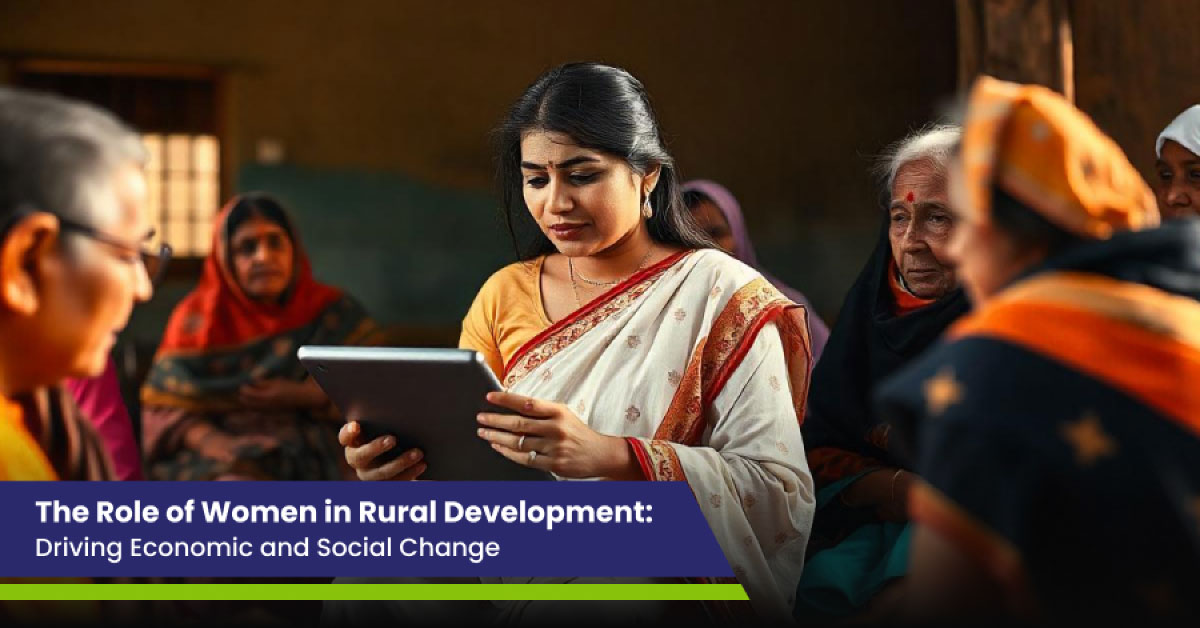Women play a crucial role in rural development. They contribute to agriculture, entrepreneurship, education, and healthcare. Despite their significant contributions, they often face challenges such as financial constraints and societal restrictions.
Empowering women in rural areas has the potential to transform communities, boosting economic growth and improving social conditions. This blog will explore the concept of rural development, its importance, and the vital contributions of women.
What is Rural Development?
Rural development refers to improving the quality of life and economic well-being of people living in rural areas. It includes better access to education, healthcare, employment, and infrastructure.
Developing rural areas ensures sustainable growth. It helps in reducing poverty and increasing opportunities. Women in rural development play a vital role in driving these changes.
The Importance of Rural Development
Rural development is necessary for economic stability and social progress. It helps in reducing inequalities and ensuring a better future.
Key Benefits of Rural Development:
- Reduces Poverty – It creates job opportunities and improves living conditions.
- Enhances Agriculture – Rural development strengthens the agricultural sector, a major source of income in rural communities.
- Improves Healthcare – It ensures better medical facilities and health awareness.
- Boosts Education – Increased access to schools and training programs equips rural youth and women with valuable skills.
- Strengthens Infrastructure – Roads, electricity, and clean water improve rural communities.
- Encourages Entrepreneurship – Support for small businesses helps rural economies grow.
The Role of Women in Rural Development
Women are the backbone of rural economies. They play a critical role in agriculture, entrepreneurship, education, and healthcare. Their contributions help drive economic growth and improve social conditions in villages. Despite their crucial role, the contributions of women in rural development often go unrecognized.
According to the Food and Agriculture Organization (FAO), women make up 43% of the global agricultural workforce. In India, over 80% of rural women are engaged in agricultural activities; however, their contributions are often undervalued due to limited financial independence and land ownership. Empowering women with education, resources, and opportunities can transform rural communities.
Key Roles of Women in Rural Development in India
1. Agriculture and Farming
Women are deeply involved in agriculture, from sowing seeds to harvesting crops. They work in fields, manage livestock, and contribute to food security. India’s National Sample Survey Office (NSSO) reports that women perform nearly 60% of agricultural activities.
Despite their efforts, only 14% of landowners in India are women. Limited land ownership restricts their access to government schemes and financial support. Recognizing their vital role and granting them land rights can significantly enhance agricultural productivity and drive rural development.
2. Entrepreneurship and Small Businesses
Rural women are emerging as entrepreneurs in various fields. They run businesses in food processing, textiles, handicrafts, and dairy farming. The Self-Employed Women’s Association (SEWA) has helped thousands of rural women build sustainable livelihoods.
Women-led microenterprises are significant contributors to the rural economy. UN Women reports that increasing female entrepreneurship can boost GDP growth by 1.5% to 2% annually. Supporting women with financial aid, training, and market access can strengthen rural economies.
3. Education and Skill Development
Educating women is key to rural progress. An educated woman ensures better education for her children and improved household income. Yet, only 59% of rural women in India are literate, compared to 78% of rural men.
Vocational training and digital literacy programs empower rural women to gain employment. Government initiatives like Skill India and Beti Bachao Beti Padhao aim to bridge this gap and promote gender equality. Encouraging education can empower women and drive long-term rural development.
4. Healthcare and Family Well-being
Women play a crucial role in improving rural healthcare. They ensure family well-being by spreading awareness about maternal health, hygiene, and nutrition. According to WHO, improving women’s health can reduce child mortality by 40%.
Under government programs, many rural women serve as Accredited Social Health Activists (ASHAs), providing essential healthcare services, including vaccinations and maternal care. Supporting women in healthcare roles can significantly improve rural health conditions.
5. Social Leadership and Governance
Women are increasingly taking leadership roles in rural governance. The Panchayati Raj system in India reserves 33% of seats for women in local governance. In some states like Bihar and Rajasthan, this quota has been raised to 50%.
Women leaders play a crucial role in implementing development projects, improving education, and addressing social issues. Studies indicate that villages with women in leadership positions often demonstrate better sanitation, education, and healthcare facilities. Encouraging more women to participate in governance can lead to inclusive and sustainable rural development.
6. Environmental Conservation
Women are at the forefront of environmental protection in rural areas. They engage in sustainable farming, afforestation, and water conservation projects. The Chipko Movement, where women in Uttarakhand bravely protected forests from deforestation, serves as a powerful example.
Women’s active involvement in conservation ensures more effective management of natural resources. Providing them with training in sustainable farming techniques can enhance environmental and economic sustainability in rural areas.
7. Financial Inclusion and Economic Empowerment
Financial independence is crucial for rural women empowerment in India. Yet, only 26% of rural women in India have access to formal banking services. Microfinance institutions and self-help groups (SHGs) play a vital role in bridging this gap.
Programs like PM Jan Dhan Yojana and Mahila E-Haat provide rural women with financial services and market access. Increasing financial inclusion allows women to invest in businesses, support their families, and contribute to rural development.
8. Women in Technology and Digital Literacy
Technology is changing rural economies, and women are becoming part of this transformation. Digital literacy programs teach women how to use mobile banking, e-commerce, and online education platforms.
The Internet Saathi program, a joint initiative by Google and Tata Trusts, has trained over 30 million rural women in digital literacy and technology. Providing access to technology helps women explore new opportunities and connect with global markets.
Related Blog: Building a Greener Tomorrow: The Role of Women in Sustainability
Challenges Faced by Women in Rural Development
Despite their contributions, women face several barriers. These challenges limit their growth and impact.
Key Challenges Faced by Women in Rural Development:
- Gender Discrimination – Women often face societal restrictions and limited rights.
- Lack of Education – Many rural women have limited access to quality education.
- Financial Constraints – Difficulty in accessing credit and financial support for businesses.
- Limited Land Ownership – Many women do not own land despite working in agriculture.
- Lack of Healthcare Facilities – Poor access to maternal health and medical services.
- Social and Cultural Barriers – Traditional roles restrict women from exploring new opportunities.
The Future of Women in Rural Development
Women’s role in rural development is evolving. With the right support, they can drive significant change.
Future Trends and Outlook:
- Increased Digital Literacy – More women will use digital tools for education and business.
- Financial Inclusion – Access to microloans and financial programs will empower rural women.
- Sustainable Farming Practices – Women will lead eco-friendly farming initiatives.
- Government and NGO Support – More policies and programs will focus on women’s empowerment.
- Entrepreneurial Growth – Women-led businesses will create more job opportunities.
FAQs About Role of Women in Rural Development
Q1. How do women contribute to rural economies?
Women contribute through farming, small businesses, and entrepreneurship. Their work supports household income and local economies.
Q2. What is the role of women in rural entrepreneurship?
Women start small-scale businesses like tailoring, handicrafts, and food production. These businesses provide financial independence and community employment.
Q3. What are some government schemes supporting rural women’s development?
Schemes like MNREGA, Mahila E-Haat, and Beti Bachao Beti Padhao help women in rural areas. These programs provide financial aid, skill training, and business support.
Q4. What impact does digital literacy have on rural women?
Digital literacy helps women access education, financial services, and business opportunities. It bridges the gap between rural and urban economies.
Q5. What steps can be taken to enhance women’s role in rural development?
Providing education, financial aid, skill development, and leadership opportunities can empower women. Government and NGO support is essential.
Conclusion
Women in rural development play a crucial role in economic and social progress. They contribute to agriculture, entrepreneurship, education, and healthcare. Despite challenges, their efforts shape rural communities.
To ensure a brighter future, women need better education, financial support, and leadership roles. Empowering them will lead to stronger and more sustainable rural economies.
Join Hands with Prabhu Naidu Ltd to Empower Women in Rural Development!
At Prabhu Naidu Ltd, we believe in creating opportunities for rural women. Our EmpowHer initiatives focus on education, skill development, and financial support.
Join us in making a difference. Together, we can empower women and build stronger rural communities. Support the change today!


